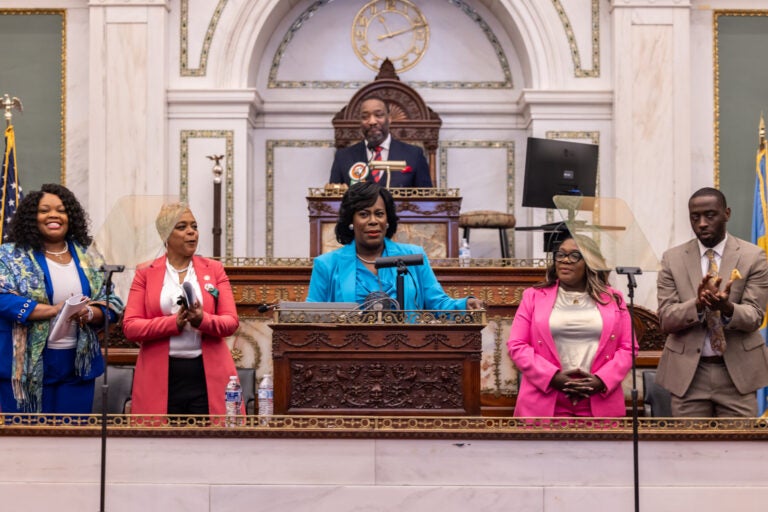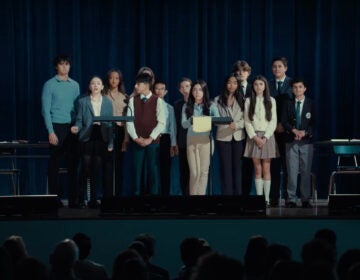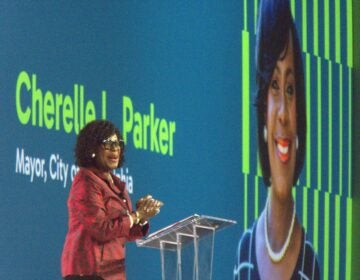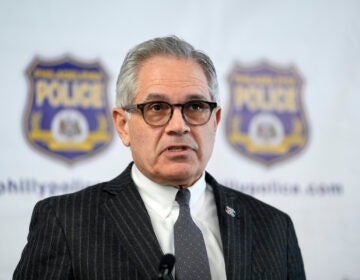Philly Mayor Parker says public safety is top priority, allocates money in budget for public safety initiatives
Mayor Cherelle Parker introduced her proposed budget to city council Thursday, with a commitment to keep city residents safe.
Listen 0:56
Philadelphia Mayor Cherelle Parker delivered her second budget address on March 13, 2025. (Kimberly Paynter/WHYY)
From Philly and the Pa. suburbs to South Jersey and Delaware, what would you like WHYY News to cover? Let us know!
During her budget address Thursday, Mayor Cherelle Parker said public safety is her top priority, touting the foundation she created called P.I.E. – Prevention, Intervention and Enforcement. Parker stated that the city can’t just depend on the police to fix problems, such as gun violence or drug sales.
Philadelphia’s One Philly 2.0 proposed budget for the fiscal year 2026 is $6.7 billion, which will include millions of dollars for public safety. Parker’s budget calls for $2.7 million to run the Neighborhood Wellness Court five days a week, $2.8 million to expand the Police Assisted Diversion program, which helps people avoid arrest for drug-related offenses, and an additional $24 million for community organizations focused on reducing violence. Those organizations received $19 million in 2024.
Under Police Commissioner Kevin Bethel, Parker said the department will invest in a new $67 million Forensics Lab at 4101 Market St. in West Philadelphia. She said all officers will be equipped with body-worn cameras by the end of 2025, and patrol cars will soon have dash cameras.
“These investments protect our officers and the public,” Parker said. “I’ve always made it clear, I fully support every police officer who’s on the front lines, protecting and serving Philadelphians, so long as they do so without any misuse or abuse of their constitutional authority.”
Parker wants to spend around $1.3 million on upgrading uniforms and $350,000 per year on recruitment. Additionally, she is proposing adding a licensed mental health professional to the police team and lactation
The mayor highlighted that in 2024, murders in Philadelphia dropped by 37% and shootings by 36%. She also mentioned that currently 200 police officers are actively engaging with local communities, and assured everyone that this approach is making a positive difference.
“But no one is exhaling or saying ‘Mission accomplished!’ around here. Every homicide, every incident of violence, is a loss for Philadelphia, and a stain on our city’s soul,” Parker said. “Someone’s son or father, daughter or mother, family member or friend — they are not statistics. They are human beings. And I will never rest until every family and individual in every neighborhood feels safe in their home and walking the streets of their community.”
Parker’s budget unveiling comes at a time when the city is faced with cuts in federal funds.
Rob Dubow, the city’s finance director, said Philadelphia’s financial cushion ended with the American Rescue Plan Act funds in December. The money is meant to help governments deal with the health and economic effects of the pandemic, keep essential public services running and support a strong and fair recovery.
“We’re still seeing inflation while it’s come down, it’s persistent,” Dubow said. “It’s a tight labor market, and then we’re also facing some real uncertainty at the federal level.”
In fiscal year 2024, Dubow said that the city received approximately $2.8 billion in federal grants, but added that uncertainty surrounds these funds as many are being reexamined or temporarily suspended. He said any reduction in these grants could significantly impact the city’s budget.
To help with any funding deficit, Dubow said the city has set aside $95 million in federal funds to respond to certain challenges, in addition to a budget savings reserve that will be $220 million next year. Dubow also mentioned that the city has a healthy savings balance.
“So all of that will put us in relatively better shape as we go into the plan,” Dubow said.
Caterina Roman, professor of criminal justice at Temple University, who focuses on community violence and public policy, said that local governments are dedicated to addressing gun violence using proven methods. However, she said that the federal money provided to these local areas during President Donald Trump’s time in office will have an impact on how they operate.
“I think it’ll hit very, very hard, and it will be harmful because a lot of the funding and a lot of the research about the evidence base has been generated at the federal level, and the federal government has always thought about how we pair funding,” Roman said. “With strong nonprofits, how do we get grassroots agencies to increase their capacity to target young people that might be in need of services?”
Roman said that the federal government usually takes the lead in creating new and innovative programs, checking how well they work and evaluating their effectiveness. She cited Cure Violence Global, a group founded in 1995 that uses a community-based violence prevention model that has been implemented across the United States and abroad.
“The federal government has been really on the forefront of identifying innovative programs and then supporting them with funding dollars as well as research,” Roman said. “And that is likely to be, all be axed and, and gone. So there will be a lot of harm to communities.”
She said that communities will need to think outside the box to find more money or even move funds from other areas to ensure that they can support programs aimed at preventing gun violence.
“It’s a matter of priorities,” Roman said.

Get daily updates from WHYY News!
WHYY is your source for fact-based, in-depth journalism and information. As a nonprofit organization, we rely on financial support from readers like you. Please give today.





